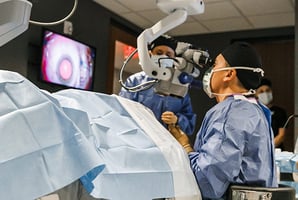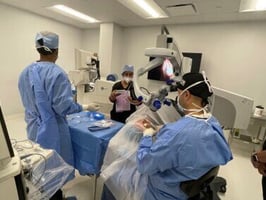When it comes to office-based surgery (OBS), the first question on every ophthalmologist’s mind is,...
The Future of Ophthalmology and Office-based Surgery at Octane
Five ophthalmic professionals presented “The Future of Ophthalmology” at Octane’s Ophthalmology Tech Forum, including; Neda Shamie, MD, Marjan Farid, MD, and Mark Kontos, MD, Taj Nasser, MD, and Tony Burns, Chief Strategy Officer of iOR Partners. The panel discussed the growing role of Office-Based Surgery (OBS) in refractive and lens-based procedures, highlighting its advantages and potential to transform the patient experiences.

What is Office-Based Surgery (OBS)?
OBS refers to surgeries performed in a physician’s office rather than in a hospital or Ambulatory Surgery Center (ASC). It is designed to provide a streamlined, patient-friendly experience, particularly for ophthalmic procedures.
iOR Partners’ Founder Tony Burns explained he originally designed the OBS model specifically for ICLs (Implantable Collamer Lens) with the goal to create a LASIK like experience. ” Over 100,000 cases have been performed in 130 iOR Suites across four countries. 98% are done without an IV. which makes it a better experience for both the physician and the patient,” said Burns.
Advantages of OBS
Patient Experience:
- OBS creates a LASIK-like experience for lens-based procedures, which appeals to patients who value convenience and efficiency.
- Patients can avoid fasting, IVs, and pre-op clearances, making the process less intimidating and more comfortable.
- The in-and-out time is significantly reduced, with patients in the office for up to 90 minutes.
Cost Efficiency:
- With OBS, surgeons do not have to pay a fee to the ASC and can potentially pass on savings to patients, making premium procedures like ICL more affordable.
- By reducing or eliminating anesthesia in the office, it becomes more cost effective for patients and payors.
Operational Benefits:
- OBS eliminates many of the regulatory requirements of ASCs, which are designed for multiple specialties, allowing for a more tailored setup specific to ophthalmology.
- Practices can maintain control over the surgical environment, improving efficiency and workflow.
Increased Premium Case Volume:
- OBS has been shown to increase the percentage of premium cases (e.g., advanced technology lenses, refractive lens exchange) due to the improved patient experience and streamlined process.
- In some practices, over 60% of cases performed in OBS are premium upgrades.
Surgeon Convenience:
- OBS simplifies the process for surgeons, allowing them to focus on patient care without the complexities of hospital or ASC protocols.
- Surgeons are independent from healthcare systems and can have full autonomy over scheduling, staffing, and the entire patient journey.
Real-World Impact

Practices that have adopted OBS report higher patient satisfaction and increased efficiency. For example, Taj Nasser, MD opened his iOR Suite at his practice, Tylock-George this past December. He said that ICL is a popular option, with patients appreciating the boutique, hassle-free experience. He highlights that one of the biggest barriers to refractive surgery is the need for expensive equipment, but ICL and OBS streamline the process, making it more accessible and efficient. Their practice emphasizes a patient-friendly experience with the motto: "No strips, no sticks, you're in and out within 90 minutes." This approach eliminates anesthesia and the need for fasting, offering a premium, boutique experience that patients appreciate. The transition has made this their popular option, benefiting both patients and the practice operationally and economically.
Future of OBS:
The panel emphasized that OBS is not a replacement for ASCs but rather a complementary tool. It allows practices to offer a premium, patient-centered experience while maintaining cost-effectiveness. As the technology and adoption of OBS grows, it is expected to play a pivotal role in the future of refractive and lens-based surgery. If you are looking to transition to office-based surgery, please take our complimentary feasibility analysis.


